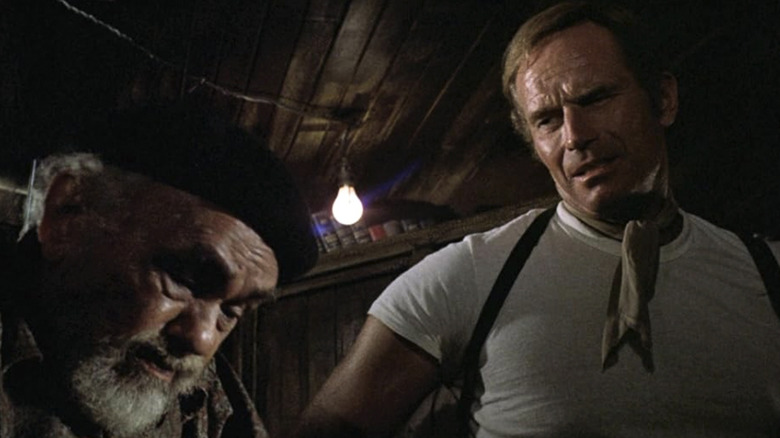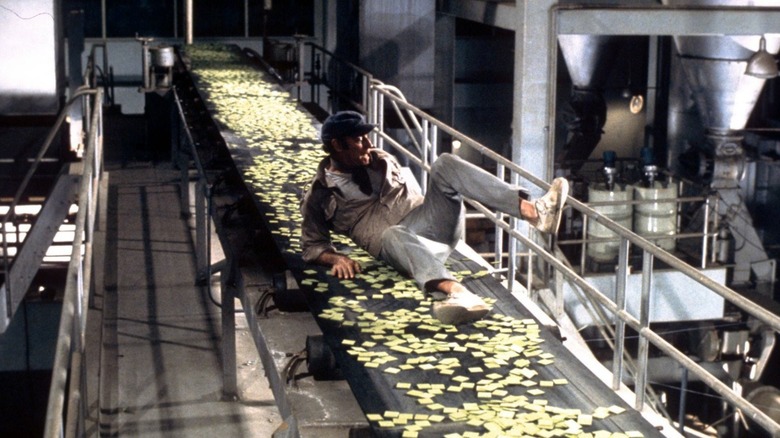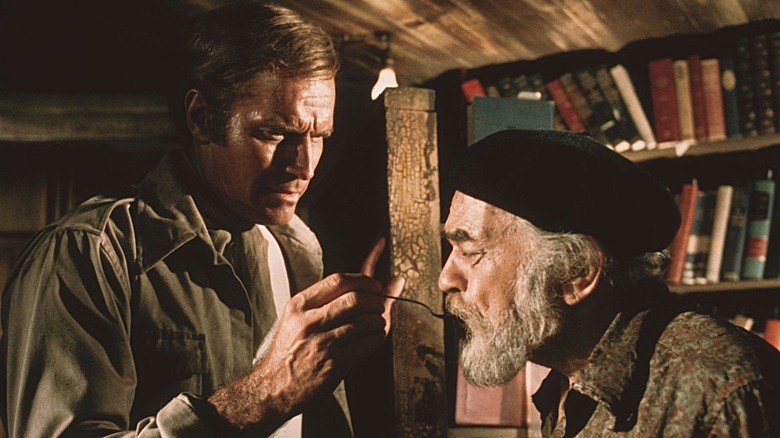Why Soylent Green's Original Author Absolutely Hated The Film's Script
This post contains spoilers for "Soylent Green" and its source material.
Richard Fleischer's 1973 dystopian sci-fi classic, "Soylent Green," ends with a shocking revelation. Set in a future consumed by ecocide — thanks to unchecked overpopulation and the depletion of resources that came with it — New York City stands on the brink of collapse. The increasing divide between the affluent and the poor has prompted riots over the artificial wafers made by the Soylent Corporation, and their latest product, the plankton-rich Soylent Green, remains coveted, while the rich indulge in organic delicacies. After NYPD detective Robert Thorn (Charlton Heston) gets embroiled in a conspiracy, he learns that the plankton claimed to produce Soylent Green has gone extinct, and that the key ingredients in the wafer instead come from human bodies. "Soylent Green is people!" he shouts in anguish to the crowd assembling around him in the end, devastated that the truth might never be uncovered.
The cannibalism twist in "Soylent Green" is absent from Harry Harrison's novel, "Make Room! Make Room!," which Fleischer's adaptation is very loosely based on. The differences between the two stories are immediate and palpable: While Harrison weaves a pragmatic cautionary tale about the horrors of ecocide in his book, Fleischer's film is mired in melodrama, undercutting the poignant themes brimming underneath. Although "Soylent Green" excels in etching a haunting visual tapestry with its overcrowded streets saturated in the sickly green hue of pollution, its thematic vision feels limited when compared to Harrison's uncompromising portrayal of a world destined to self-destruct at the turn of the millennium.
Harrison himself took issue with the Hollywood adaptation. In a now-archived blog post, the author claimed that MGM took a few measures to isolate him from the adaptation, including making sure he had minimal control over the screenplay and earned no profits after the film's modest success.
Harrison really disliked the Soylent Green script
Harrison explained that Heston and producer Walter Seltzer coaxed MGM into making a film based on "Make Room! Make Room!" (although there was an existing TV show that altered the movie's title), but the novel's exclusive focus on overpopulation was perceived as "inconsequential" by the studio. After the cannibalism aspect was introduced, the film went into production, and Harrison's involvement was nominal, as the incorporation of his notes was solely based on Fleischer's discretion.
Despite being contractually obligated to not suggest changes to the script, Harrison voiced his opinions regarding certain creative decisions that the film made, such as the unspecified time period that cushioned the opening. After the author pointed out that a near-future setting would grant more weight and immediacy to the events, Fleischer and his team whipped up a strong opening that rooted the events in the year 2022, and the film is better for it.
This is just one example of how Harrison's notes actually helped refine the adaptation, but the author did not mince words when it came to expressing his disappointment regarding the script:
"This is when I came onto the scene, to be instantly impressed by two inescapable facts: the truly professional ability of everyone connected with the making of the film and the truly appalling quality of the script, which transmogrified, denigrated, and degutted the novel from which it had been taken."
While Harrison was not fond of certain aspects of the script, he maintained a deep appreciation for Fleischer, the cast, and the creatives involved, as they captured the core of the novel while diverging from it in significant ways. For instance, Edward G. Robinson, who played Sol Roth, consciously enriched his performance after learning more about the character's novel counterpart from Harrison, investing Sol with the depth that was absent in the lackluster script.
Soylent Green made some weird changes to the story
Apart from the cannibalism storyline, which works pretty well within the context of the film, the script introduced some changes that completely missed the point of Harrison's novel. In "Make Room! Make Room!," Sol is one of the few characters to have experienced the world at its best, having indulged in a time where resources were unevenly distributed yet abundant, and access to fresh, organic food was still a possibility for the less affluent. This is a man who has spent most of his life in comfort, but the overwhelming reality of the present pushes him toward activism, and he decides to participate in a protest against corrupt megacorporations, dying shortly after due to pneumonia.
In the film, Sol's repugnance to the present leads him to a euthanasia center (a sequence that feels harrowing and pointed), but Harrison felt that Sol would never do that, as he was meant to be an unwilling survivor in a world crashing in front of his eyes. The author also took issue with other changes in the film, including the concept of "furniture" women — concubines without autonomy meant to serve the rich — calling this addition "completely irrelevant." He did, however, acknowledge the film's merits:
"Ultimately, 'Soylent Green' works as a film. It moves, it keeps the interest, it is visually exciting. The message it delivers raises it above simple entertainment."
Whether you agree with Harrison or not, it is clear that "Soylent Green" is a classic case of a studio-botched premise, where some of the finer nuances of the source material were lost in favor of genre sensationalism and melodrama. As Harrison said, the mixed results are the fruits of a "hard battle," one he would remember forever.


